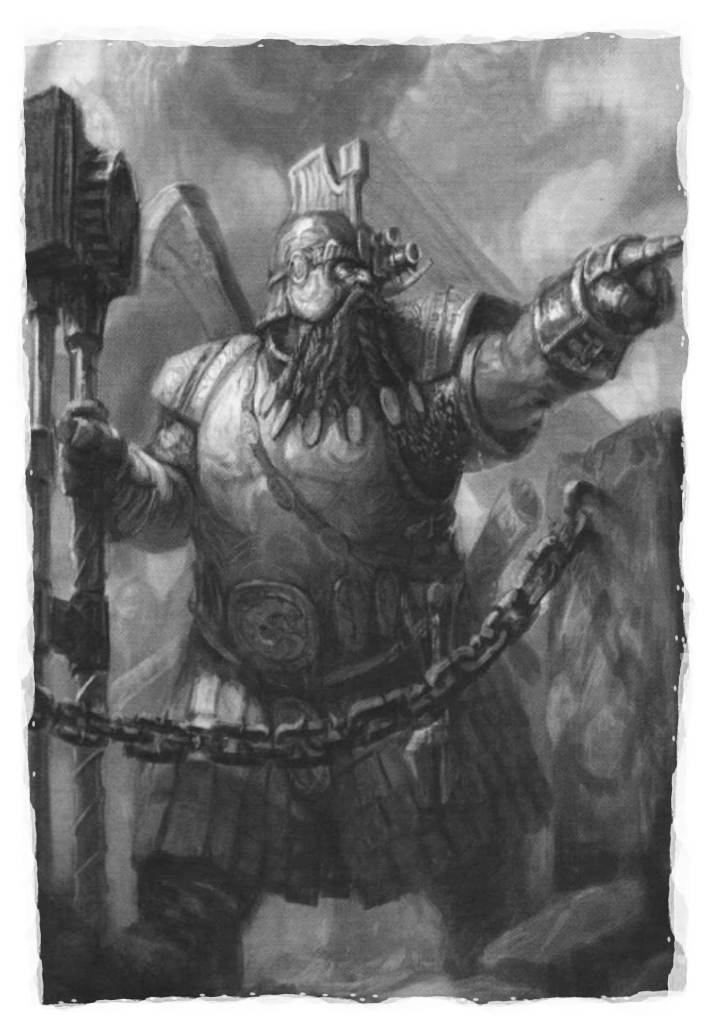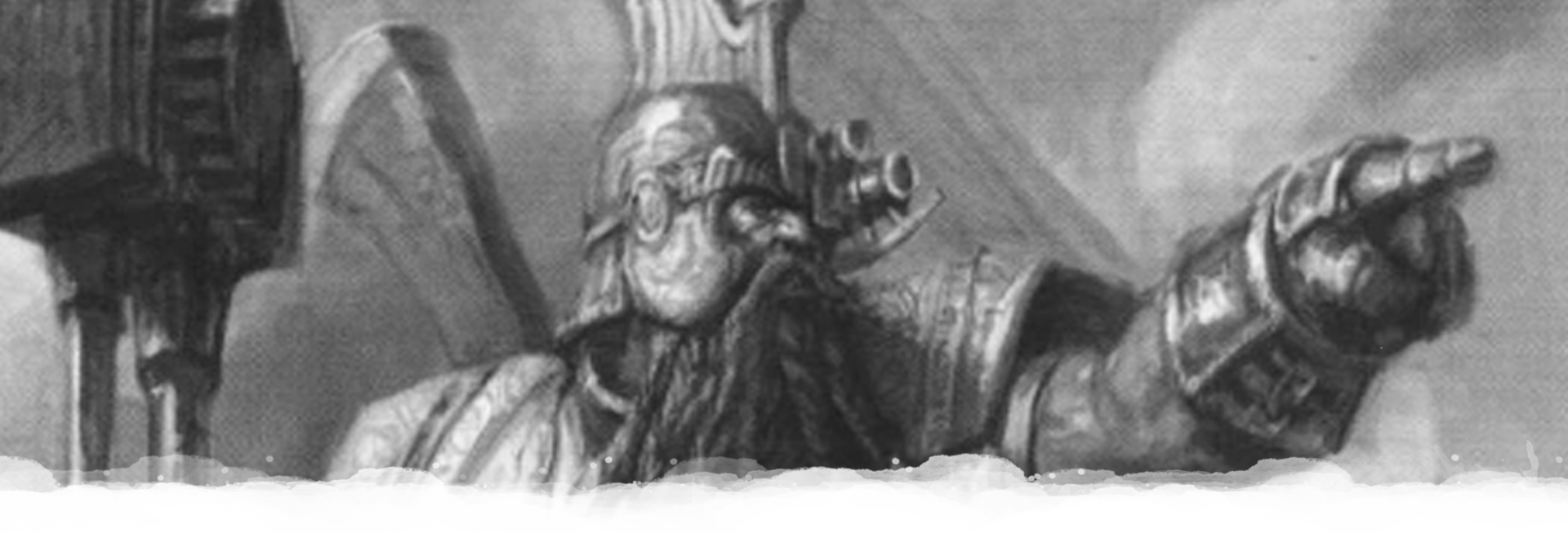Gundrim
Gundrim is considered the lord of all dwarven engineers, scholars, and mages. He is a lesser dwarven ancestral god of smithing, artifice, and invention, and while a lesser ancestral god, he is by no means any less respected than Duun, under whom he is often seen as a dutiful if reckless forge-hand. He champions the unrestricted merging of imagination and creation, and urges his followers to constantly innovate. Throughout dwarven history, he has gained numerous titles: the Soot-Faced God, the Runelord, and the God of Brass, after his affiliation with dwarven clockwork machines, of whose components are typically forged from brass. It is said that the clockwork and steam-powered technologies of the dwarven peoples were inspired partly by Gundrim himself.
Before his ascension to the Dwarven Pantheon after his death, he was one of the first engineers, and the greatest inventors and mages in dwarven history. He perfected the art of dwarven clockwork, and effortlessly wove metal with Magic. He also pioneered a number of inventions that revolutionized dwarven mining operations through the use of black powder, the recipe for which Gundrim had learned from the orcs of the Empire of the Celestial Dragon who had used it for centuries in devices called 'fire works'.
Depiction
Gundrim is often depicted as a middle-aged male dwarf with a soot-black beard, and a series of runed metal plates bolted into his bald head. He is portrayed as a tall and wise figure wearing runic regalia of brass and gold. Much like Duun, he is also sometimes seen in a simple and humble dress, wearing an apron, stood by Duun's side learning from the master artisan himself. A halo of runes of power surrounds his head at all times, and the flames of a forge roar behind him.Tenets of Faith
Actions count. Intentions and thought are one thing, but it is the result that is most important. Talk is for others, while those who serve Gundrim do. Make new things that work. Become skilled at forging or some craft, and practice making things until you can create devices to suit any situation or space. Fear neither innovation nor magic. Practice experimentation and innovation in the making of tools and the implementation of processes, and encourage these virtues in others through direct aid, sponsorship, and diplomatic support. Learn the benefits of magic and weave it into your creations. Magic is a gift, and its power should be respected, not shunned nor misused. Learn from History. History is filled with valuable knowledge and provides infinite avenues for inspiration. Learn from the past and think to the future. Archive your ideas, and sample devices so that others may follow your work and improve on what you leave behind. Observe, acquire, and store safely the makings of others and spread such knowledge among the Consecrated of Gundrim. Discuss ideas and spread them so that all may see the divine light that is the God of Brass.The Church of Gundrim
The heart of Gundrim's church and center of Gundrim's worship is located within the halls of the Inventor's Guild within the stronghold of Druvenholme. This monastery is run by the Anvils of Gundrim, an erudite collective of engineers, scholars, and mages who seek to spread Gundrim's teachings of innovation. The church of Gundrim consists mostly of wandering clerics who traveled from settlement to settlement, finding work as artisans and archivists. Settling in one area is only encouraged in centers of innovation that warrant constant observation, such as Duunhollow, Druvenholme, and even Savant's Prospect. The church encourages wealth, as wealth demonstrates the benefits of following Gundrim. As they travel, clerics of Gundrim take samples of any inventions they discovered and assisted innovators they encounter, filing regular reports to their superiors. The Inventor's Guild's purpose is in providing the Meyland with the latest in a long-line of technological advancements and magnificent machinery. This illustrious institution is located within the great workshops of Druvenholme. It is from here that the Guild regularly teaches new and would-be dwarven engineers the basics of mathematics and standard engineering. Most of their inventions are practical: pumps to clear water from mine workings, engines and clockwork to draw steel cages up vertical shafts, and steam-powered drilling devices to penetrate the underworld. The Inventor's Guild also perfected the recipe for, and usage of, black powder first learned from the Orcs of the Empire of the Celestial Dragon, where it was used in contraptions called 'Fire Works'. Inspired by these small recreational rockets, the Inventor's Guild invented gunpowder in C. -312, naming it after Gundrim himself. Gunpowder kickstarted a second revolution in warfare. The Guild even perfected the first designs of Orcish cannons, creating the very first hand-cannons, which later became the first firearms. While still experimental technology, 'guns', are powerful force amplifiers in warfare, and are named after the guild's deity. Temples to Gundrim are imposing, boxy stone structures surrounded by dwarven porticoes. The only internal decorations were sprawling exhibits of items and tomes. While some of them are of historical interest, some represent the latest work of master crafters. The central altar consists of a massive anvil surrounded by spinning cogs in a giant machine. Backrooms consist of workshops and study rooms. It was also the Anvils of Gundrim who established the League of Explorers, an organization dedicated to researching ancient history. Their headquarters is located within Duunhollow, and they have many archaeological dig-sites in all corners of the world, from Meyland, to Tansia, and Vaskyr.
Portfolio
Dwarves, Innovation, Engineering, History, Magic
Dwarves, Innovation, Engineering, History, Magic
Divine Classification
Lesser Ancestral God
Religions
Alignment
Neutral
Species
Children
Gender
Male




Comments